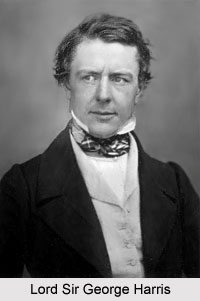 George Harris, formally addressed as Sir George Francis Robert Harris, 3rd Baron Harris GCSI was appointed as the Governor of Madras Presidency from 1854 to 1859, under the rule of the British Empire in the erstwhile undivided India. He was a well known British peer, a colonial administrator and a Liberal politician. George Harris joined the Liberal Party and acted as the Governor of Trinidad from the year 1846 to 1854. He died in England in 1872. George Harris was knighted with Knight Grand Commander (GCSI) of The Most Exalted Order of the Star of India.
George Harris, formally addressed as Sir George Francis Robert Harris, 3rd Baron Harris GCSI was appointed as the Governor of Madras Presidency from 1854 to 1859, under the rule of the British Empire in the erstwhile undivided India. He was a well known British peer, a colonial administrator and a Liberal politician. George Harris joined the Liberal Party and acted as the Governor of Trinidad from the year 1846 to 1854. He died in England in 1872. George Harris was knighted with Knight Grand Commander (GCSI) of The Most Exalted Order of the Star of India.
Early Life of George Harris
George Francis Robert Harris was born on 14 August 1810 in Belmont in Kent, United Kingdom. His father was George Harris, 2nd Baron Harris and his mother was Eliza Selina Anne. His grandfather George Harris, 1st Baron Harris, commanded the army of the British East India Company in the 4th Mysore War. George Harris completed his education from Eton College and under the private tutorship of Reverend John Shaw. He later admitted to the Merton College in Oxford in 1829. Harris did his graduation in arts from Christ Church, Oxford in the year 1832.
Career of George Harris
Sir George Francis Robert Harris, 3rd Baron Harris GCSI was appointed as the Governor of Trinidad in the year 1846. He served in the position until 1854. Later on 28 April 1854, he was appointed as the Governor of Madras Presidency and was preceded by Daniel Eliott. The Madras Presidency, also known as the Presidency of Fort St. George and Madras Province, was an administrative sub division of British dominated India. The territory included most of southern India, such as the modern states of Tamil Nadu, the Coastal Andhra and Rayalaseema regions of Andhra Pradesh, Lakshadweep Islands, the Malabar region of North Kerala, Koraput, Malkangiri, Nabarangapur and Gajapati districts of southern Orissa and the Bellary, Ganjam, Dakshina Kannada, Rayagada and Udupi districts of Karnataka.
During his tenure as the Governor of Madras Province, George Harris restructured the police system in the Presidency. This reorganized police force formed the basis of the modern India Police. He commenced the first regular passenger train service in the region from the city of Madras (now Chennai) and Arcot town on 1 July 1856. Moreover the University of Madras was founded in 1857 under his administration. George Harris also led the Torture Commission in September 1854, which investigated the allegations of torture imposed by revenue officials on Indian peasants. Throughout his tenure, Harris tried to regulate the freedom of the press.
During the Great Revolt of 1857, also known as the Sepoy Mutiny, the native rulers of the Madras province maintained their loyalty to the British Government. Harris continued as the Governor even after the reassignment of authority over India to the British crown from the British East India Company in the year 1858. George Harris
Served in office until 28 March 1859 and was succeeded by Sir Charles Edward Trevelyan, 1st Baronet, KCB.
Personal Life of George Harris
Lord Sir George Francis Robert Harris, 3rd Baron Harris GCSI was married with Sarah Harris, who was the daughter of the Venerable George Cummons, Archdeacon of Trinidad, in 1850. George Harris died at the age of 62 years on 23 November 1872 in United Kingdom. He was succeeded in the barony by his son Robert Harris, 4th Baron Harris.






































